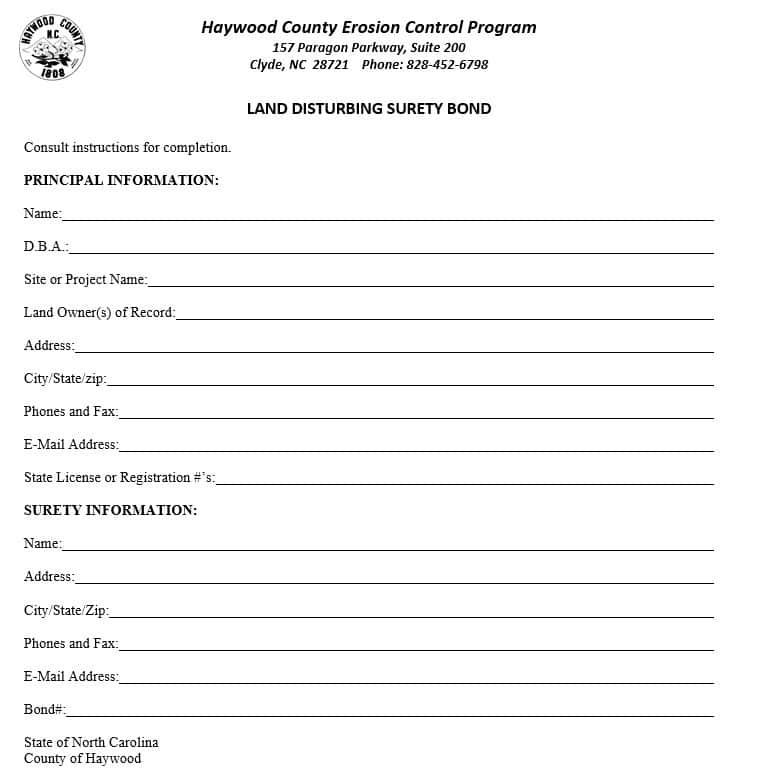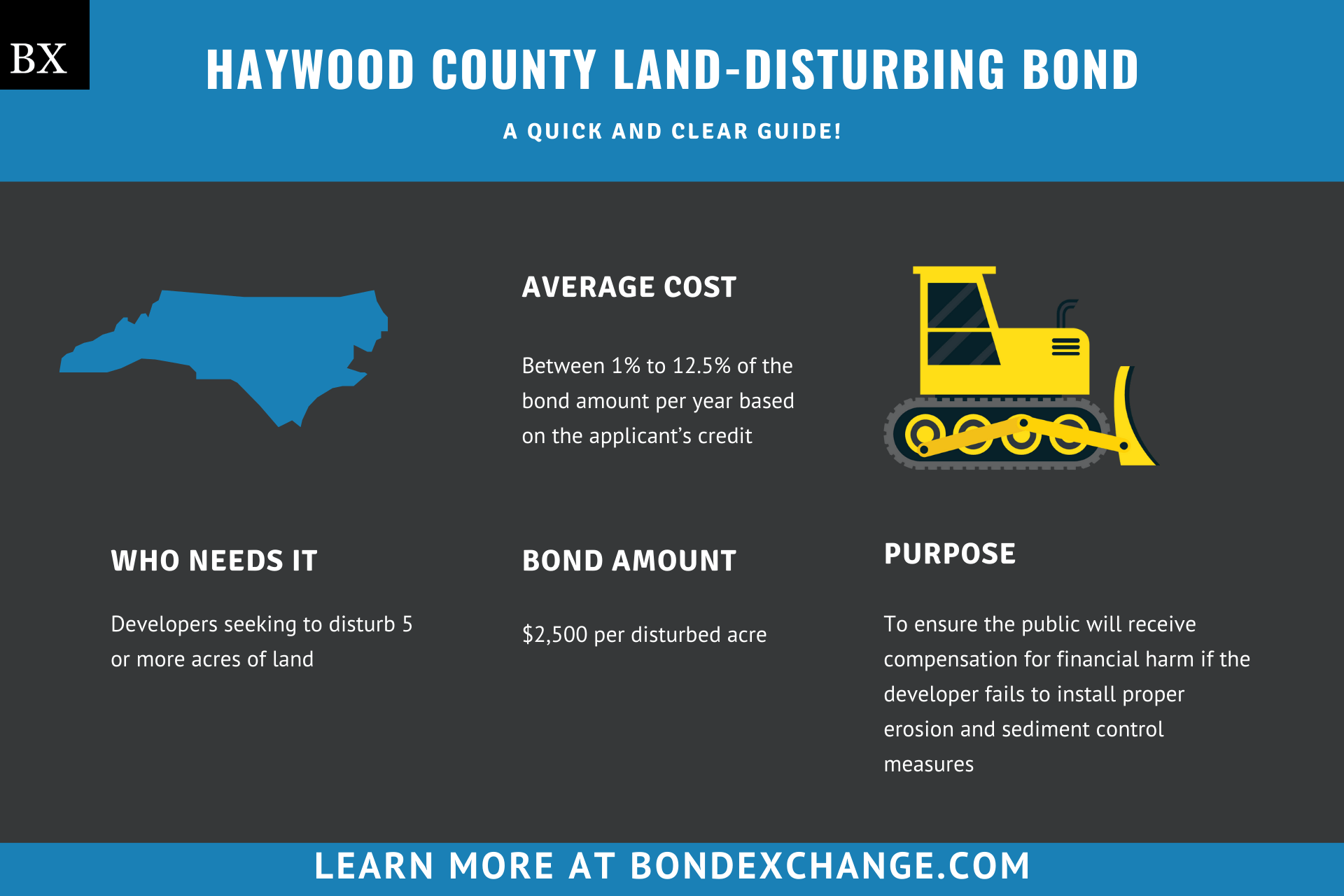Haywood County Land-Disturbing Bond: A Comprehensive Guide
This guide provides information for insurance agents to help their customers obtain a Haywood County Land-Disturbing bond
At a Glance:
- Lowest Cost: $150 per year or $15 per month, based on the applicant’s credit
- Bond Amount: $2,500 per disturbed acre
- Who Needs it: Developers seeking to disturb 5 or more acres of land in Haywood County, North Carolina
- Purpose: To ensure the public will receive compensation for financial harm if the developer fails to install proper erosion and sediment control measures
- Who Requires the Bond: Haywood County, North Carolina

Background
Haywood County Ordinance 154.60 requires developers conducting land-disturbing activities to obtain a permit from the Development Services Department. The Haywood County Board of Commissioners enacted the permit requirement to ensure that land-disturbing activities do not cause excessive erosion and sedimentation. To provide financial security for the enforcement of the permitting requirement, developers seeking to disturb 5 or more acres of land must purchase a surety bond to be eligible for a land-disturbing permit.
What is the Purpose of the Haywood County Land-Disturbing Bond?
Haywood County requires developers seeking to disturb 5 or more acres of land to purchase a surety bond as part of the application process to obtain a land-disturbing permit. The bond ensures that the county will receive compensation for financial harm if the developer fails to abide by the regulations outlined in Haywood County Ordinance 154.73. Specifically, the bond protects the county if the developer fails to implement the required erosion and sediment control measures. In short, the bond is a type of insurance that protects the county if the developer violates the terms of their permit.
How Can an Insurance Agent Obtain a Haywood County Land-Disturbing Surety Bond?
BondExchange makes obtaining a Haywood County Land-Disturbing Bond easy. Simply login to your account and use our keyword search to find the “Haywood County” bond in our database. Don’t have a login? Gain access now and let us help you satisfy your customers’ needs. Our friendly underwriting staff is available by phone (800) 438-1162, email or chat from 7:30 AM to 7:00 PM EST to assist you.
At BondExchange, our 40 years of experience, leading technology, and access to markets ensures that we have the knowledge and resources to provide your clients with fast and friendly service whether obtaining quotes or issuing bonds.
Not an agent? Then let us pair you with one!
Click the above image to find a BX Agent near you
How is the Bond Amount Determined?
Haywood County Ordinance 154.73 dictates that the bond amount must be equal to $2,500 per disturbed acre (rounded up).
Is a Credit Check Required for the Haywood County Land-Disturbing Bond?
Surety companies will run a credit check on the applicant to determine eligibility and pricing for the Haywood County Land-Disturbing bond. Applicants with excellent credit and work experience can expect to receive the best rates. Applicants with poor credit may be declined by some surety companies or pay higher rates. The credit check is a “soft hit”, meaning that the credit check will not affect the applicant’s credit.
How Much Does the Haywood County Land-Disturbing Bond Cost?
The Haywood County Land-Disturbing bond can cost anywhere between 1% to 12.5% of the bond amount per year. Insurance companies determine the rate based on several factors including your customer’s credit score and experience. The chart below offers a quick reference for the bond cost on a $15,000 bond requirement.
$15,000 Land-Disturbing Bond Cost
| Credit Score | Bond Cost (1 year) | Bond Cost (1 month) |
|---|---|---|
| 720+ | $150 | $15 |
| 680 – 719 | $225 | $23 |
| 65o – 679 | $300 | $30 |
| 600 – 649 | $600 | $60 |
| 550 – 599 | $1,125 | $113 |
| 500 – 549 | $1,875 | $188 |
Who is Required to Purchase the Bond?
Haywood County requires developers seeking to disturb 5 or more acres of land to purchase a surety bond as a prerequisite to obtaining a land-disturbing permit. Haywood County Ordinance 154.01 defines “land-disturbing activity” as any action that alters the natural topography of a piece of land and has the potential to cause sedimentation.
The following land-disturbing activities are exempt from all bonding and permitting requirements:
- To fight fires
- Not exceeding 21,780 square feet in surface area
- Processing of sand, stone, or gravel in material processing plants and storage yards (sediment control measures must be utilized to prevent off-site damage)
BondExchange now offers monthly pay-as-you-go subscriptions for surety bonds. Your customers are able to purchase their bonds on a monthly basis and cancel them anytime. Learn more here.
How do Developers Apply for a Land-Disturbing Permit in Haywood County?
Developers in Haywood County must navigate several steps to obtain a Land-Disturbing Permit. Below are the general guidelines, but developers should refer to the permitting statutes for details on the process.
Permit Period – All Haywood County Land-Disturbing Permits are valid for 18 months from the date of issuance
Step 1 – Contact the Erosion Control Program
Developers seeking a land-disturbing permit should contact the Erosion Control Program. A representative from the program will walk the developer through the application process, provide them with any forms that need to be submitted, and answer any questions that they may have.
Step 2 – Create an Erosion and Sediment Control Plan
Developers disturbing at least half of an acre of land must create an erosion and sediment control plan before applying for a permit. The plan must contain all relevant drawings, maps, assumptions, calculations, and narrative statements necessary to describe the nature of the land-disturbing activity and how the developer plans to safeguard against erosion and sedimentation. Developers should submit their completed erosion and sediment control plans to the following address:
157 Paragon Parkway
Suite 200
Clyde, NC 28721
Plans requiring prior approval must also be submitted to the Haywood County Soil and Water Conservation District
All plans must be accompanied by a statement of financial responsibility and ownership that has been signed by the person financially responsible for the project as well as an environmental impact statement (if applicable). Additionally, developers must pay a fee of $350 per disturbed acre (rounded up) as well as an additional 10% of the total fee if the activity may impact classified trout waters.
Developers should refer to the plan review checklist for a complete list of what must accompany the plan.
*Developers disturbing less than one-half of an acre for any house or commercial site are still required to submit if a plan if they are subject to any permitting requirements
Step 3 – Complete the Application
After reviewing the completed plan, the Erosion Control Program will provide the developer with a permit application form that must be completed and submitted to the following address:
157 Paragon Parkway
Suite 200
Clyde, NC 28721
Developers must complete the application in its entirety, and submit the following items:
-
- Completed financial responsibility and ownership form
- Signed erosion and sediment control plan design checklist
- Two copies of the approved erosion and sediment control plan
- Affidavit for Land-Disturbing Activities
Step 4 – Purchase a Surety Bond
Developers disturbing 5 or more acres of land must purchase and maintain a surety bond.
Do Haywood County Developers Need to Renew Their Land-Disturbing Permits?
No, developers in Haywood County do not need to renew their permits. However, developers must obtain a new permit for every land-disturbing project they undertake. All Haywood County Land-Disturbing Permits are valid for 18 months from the date of issuance.
What are the Insurance Requirements for Haywood County Land-Disturbing Permits?
Haywood County does not require developers to purchase any form of liability insurance as a prerequisite to obtaining a land-disturbing permit. However, developers may need insurance before obtaining a local business license or building permit. Developers disturbing 5 or more acres of land must purchase and maintain a surety bond with a limit of $2,500 per disturbed acre.
How Do Haywood County Developers File Their Land-Disturbing Bonds?
Developers in Haywood County should submit their completed bond forms, including the power of attorney, to the following address:
157 Paragon Parkway
Suite 200
Clyde, NC 28721
The surety bond requires signatures, including witness signatures, from both the surety company that issues the bond and from the applicant. The surety company should include the following information on the bond form:
- Legal name, address, email address, phone number, and state license number of entity/individual(s) buying the bond
- Surety company’s name, address, email address, and phone number
- Project name
- Bond amount
- Name of the city’s development order
- Name of the development
- Date the bond is signed
What Can Haywood County Developers Do to Avoid Claims Against Their Land-Disturbing Bonds?
To avoid claims on their Land-Disturbing bonds, developers in Haywood County must ensure that they adequately install all required erosion and sedimentation control measures and devices.
What Other Insurance Products Can Agents Offer Developers in Haywood County?
Most reputable developers will purchase liability insurance. Bonds are our only business at BondExchange, so we do not issue any other types of insurance, but our agents often utilize brokers for this specific line of business. A list of brokers in this space can be found here.
How Can Insurance Agents Prospect for Haywood County Developer Customers?
Haywood County unfortunately does not provide a public database of active land-disturbing permits. We suggest contacting the Erosion Control Program to obtain this information. Contact BondExchange for additional marketing resources. Agents can also leverage our print-mail relationships for discounted mailing services.


